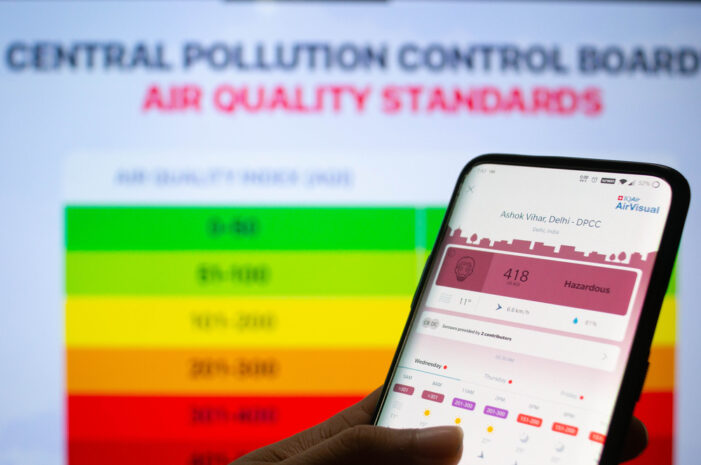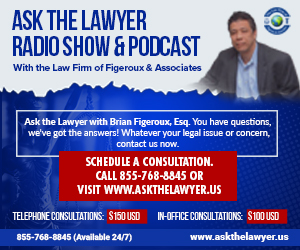Editorial credit: Memories Over Mocha / Shutterstock.com
From limiting outdoor exposure to wearing a mask to cleaning air filters — New Yorkers can take steps to protect themselves.
Smoke from wildfires in Canada brought another day of especially bad air quality in New York City on Wednesday, canceling after-school activities for kids, smudging the skyline and smelling up the streets.
What is happening in NYC?
The air quality index in the city reached 484 AQI, a measure of various air pollutants on a single scale, which is the highest ever recorded here. The higher the AQI scores, the worse the air quality.
Scores above 300 are considered hazardous. As smoke conditions worsened Wednesday afternoon, the Federal Aviation Administration grounded flights at LaGuardia Airport because of low visibility.
“That is clearly alarming for all New Yorkers,” Mayor Eric Adams said Wednesday evening. “This is the highest level index of our knowledge since the ‘60s.”
Adams said all city outdoor events would be canceled. Public city beaches were also closed on Wednesday at 3:00 p.m., according to the Parks Department. And alternate-side parking was suspended for Thursday, June 8.
“We are strongly recommending that others follow our lead and not conduct outdoor activities if not necessary,” he said.
In recent summers, wildfire smoke has drifted to New York City from the West Coast, but this week’s haze is the most severe in decades. And we’re in for more of the same throughout the week and possibly into the weekend, officials and meteorologists predict.
“We expect this to be a multiple-day event,” said Zach Iscol, commissioner for the city Office of Emergency Management (OEM), earlier on Wednesday.
The poor conditions — brought on by smoke in the atmosphere that contains chemicals and particulate matter that can damage the lungs, heart and other organs — caught many New Yorkers off guard this week, particularly since city officials were slow to communicate as the haze thickened.
Public schools announced activity cancellations for Wednesday after 11 p.m. on Tuesday. The mayor spoke to the media on the third day of smoke conditions, the morning after the city saw levels of pollution that earned New York a dubious title: most polluted city in the world.
Adams, however, defended his administration on Wednesday saying at a press conference that “there’s no blueprint or playbook for these type of issues” and urged reporters to “not create controversy where there is none.”
Speaking from the Brooklyn headquarters of OEM, “There were no late notifications,” he said. “Our role as an administration is to make sure that we give good information, but don’t create panic.”
THE CITY spoke with experts about how New Yorkers should stay safe during the decline in air quality. Here’s our guide, which we will continue to update with new information:
How worried should you be?
If you are in what officials call a vulnerable or sensitive group — the elderly, children and people with respiratory, heart or other health issues — you should take this seriously. Stay inside and monitor any symptoms as they arise, health officials say. The risks are higher for pregnant people, children, the elderly and those with chronic lung and respiratory conditions like asthma and COPD. Particulate matter exposure can worsen heart and lung diseases, and can trigger asthma attacks and heart attacks.
And all New Yorkers should limit their outdoor activity. “Avoid going outside unless you absolutely have to,” said city Health Commissioner Ashwin Vasan on Wednesday.
What if I have to work outside? Should I wear a mask?
Yes you should, Vasan said. While the city’s air quality alert is in effect, wear a tight-fitting, high-quality mask like a KN95 or N95 while outside — whether you’re working or just taking a walk.
Ilias Kavouras, chairman of environmental sciences at the CUNY Graduate School of Public Health, echoed that advice.
“We should be very cautious and concerned,” Kavouras said. “People should wear their masks. I hope by now everyone at least has a couple of them left over from what we went through the last three years.”
Gov. Kathy Hochul announced Wednesday evening that one million N95 masks would be available for free at MTA stations, the Port Authority Bus Terminal and the Javits Center, among other state facilities. Adams said the city on Wednesday evening was coordinating mask distributions at firehouses and police precincts and would hand out masks at NYCHA developments.
Should I exercise outside?
No. Vigorous activity outside, even for healthy people, can cause symptoms like inflammation, fatigue, difficulty breathing and irritation of the eyes, nose or throat. Heavy breathing can result in increased inhalation of particulate matter.
“This is not the day to train for a marathon,” Adams said Wednesday.
When should I see a doctor or go to the hospital?
Each individual has their own level of sensitivity to smoke, so it’s important to seek medical attention if you feel like there’s something wrong.
“If you feel like you’re experiencing any type of respiratory distress or obviously any type of anything related to your heart — especially if you’re an older person, especially in more vulnerable populations or those who have pre-existing conditions — you should just go in and get checked out,” said Dr. Mary Prunicki, director of air pollution and health research at Stanford University’s Sean N. Parker Center for Allergy and Asthma Research.
How do I take care of my pets?
Smoke can affect the health of animals, and just like humans, pets with cardiovascular or respiratory problems are at a higher risk. Keeping pets indoors as much as possible and maintaining high air quality in your home are as important for animals as much as for humans.
“Animals process poor air differently. They have different respiratory systems, and they can’t wear masks, so we are recommending that you don’t take your pets outside either, or at least limit and reduce the amount of time you have your pets outside,” Vasan said Wednesday evening.
If animals are experiencing coughing or gagging, difficulty breathing, eye irritation, weakness or other symptoms, you should call your veterinarian, according to guidance from the American Veterinary Medical Association.
How does this compare to a ‘typical’ bad air quality day?
An AQI between 0 and 50 is good, with little to no risk, according to the National Weather Service. New York City’s average air quality in recent years has remained in that range, per IQAir, a Switzerland-based air quality information company.
The threshold for an air quality alert from OEM is 100 AQI, according to Iscol, the commissioner.
Dr. George Thurston, a professor of medicine and population health at NYU School of Medicine, said the particulate matter from wood burning is less toxic — based on a per mass basis — than the particulate matter that comes from burning the fossil fuels of coal, oil and gas.
That means that New Yorkers should be more concerned about the toxic fumes they breathe every day from traffic exhaust than isolated, relatively rare fire smoke events.
“Over the long haul, those have a much greater cumulative effect on their health than a brief high episode like this,” Thurston wrote in an email.
New York City’s air quality has improved considerably over the past few decades as a result of city, state and federal regulations, but there’s still much progress to be made.
The same meteorological effects that blows smoke from wildfires elsewhere also blows pollution into New York City.
“In so-called normal times, we get a fair amount of our pollution from power plants in the midwest, like Ohio,” said Dr. Steven Markowitz, director of the Barry Commoner Center for Health and the Environment at Queens College, who has run air quality monitors around the city for more than a decade.
People who live or work in neighborhoods that typically tend to have worse air quality because of power plants or industrial facilities located nearby or highways running through — like in the South Bronx — may be even more at risk than others.
The wildfire smoke would cause “a double whammy,” Thurston said. In those neighborhoods, which tend to be poorer, the rates of emergency room visits for asthma are three times higher than in more affluent areas.
He added that the most effective way to reduce air pollution is to decrease fossil fuel combustion locally, as well as slashing emissions from vehicles, buildings and power plants.
“This is climate change in action, and we must continue to draw down emissions, improve air quality and build resiliency,” Adams said on Wednesday.
How safe is air in the subway system?
There is no publicly available information on air quality within the train system, but Dr. Terry Gordon, a professor in the department of medicine at NYU School of Medicine, sent two of his students to the Broadway-Lafayette stop in Manhattan into collect data.
They “measured nearly the same absurdly high particle concentrations above ground and in the subway,” Gordon said. “So, yes, right now people should be concerned about the air quality in the subway stations and above ground. It appears that the wildfire smoke is penetrating the subways.”
MTA spokesperson Kayla Shults said, “The MTA is closely monitoring reports of atmospheric conditions which are being pushed into the New York metropolitan area, including smoke, and recommends heeding guidance that the City and State are providing to the public.”
As for advice to its own workers, in an internal bulletin obtained by THE CITY, a New York City Transit safety official wrote that N95 or KN95 masks “must be provided to employees upon request.”
Within train cars, the MTA has piloted air filtration systems designed to replace the air inside a car a dozen times an hour. But those systems are installed only in a fraction of subway cars.
Can I run an air conditioner? What about opening the window?
If you do run your air conditioner, make sure the filter is clean and functioning properly. Otherwise, the air conditioner may just be blowing in dirty air from outside without cleaning it — which won’t help you at all.
The good news, said Kavouras of CUNY, is “the vast majority of air conditioners don’t bring outside air inside.”
“They cool it down by circulating indoor air,” he said.
The Environmental Protection Agency has more tips here on using an air conditioner during smoky conditions.
And don’t open your window. If the air quality is bad, keep your windows as closed and sealed as possible.
Run an air purifier, if you have one. And Purnicki suggested holding off on cooking with gas stoves when ventilation isn’t possible, as using fossil fuel indoors negatively impacts air quality.
Where can I monitor the air quality in my neighborhood?
There are a number of places to see what the Air Quality Index, or AQI, is in your area.
Sites like IQAir and AirNow provide information about the concentration of pollutants in the air, and you can learn about different neighborhoods’ air quality using this tool from the city health department. The National Weather Service also publishes air quality notifications.
Experts say it’s important to check on local air quality, as some neighborhoods experience worse effects than others, and the amount of pollution changes througout the day.



